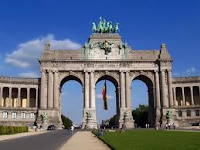Last
night I attended a reception at the beautiful residence of the German
Ambassador to Singapore to mark the ties between Germany and Singapore in the
life sciences. It gave the recent THE world
rankings of universities some real
world context, in the sense of showing the rise of Asia in some of the new
growth sectors and the link to higher education. One of the speakers was
Dr. Andreas Schmidt, the CEO of Ayoxxa,
a biotech firm based in Cologne and Singapore that just raised a round of
investments to develop and bring to market its chip-based protein analysis
technology. That technology was developed by Dieter Trau, a German
bioengineering professor at the National
University of Singapore. NUS, which didn’t break the top 50 best
schools for the life sciences as recently as two years ago, is now ranked 33rd in the world.
Other
speakers talked about ‘Singapore as the new US’ and ‘the East as the new West’,
highlighting, if in a slightly hyperbolic way, the ease of doing business in
Asia and the growing talent pool in the region. Singapore and Germany were
touted as bridges on their respective continents, given their central location,
and thus natural partners to bring these two zones together.
Is there
a new era dawning where Asia represents a new frontier for European
entrepreneurship? It’s hard to say. The Economist’s recent coverage of
the difficulty of starting businesses
in Europe laments the continent’s lack of entrepreneurs, thus migration
elsewhere where the conditions are better makes sense, though Berlin, London
and Stockholm are seen as hubs of
innovation. Asian investment in creating leading universities
is also an important factor: young scientists are being attracted because the quality of the
labs surpasses what they are offered in Europe and North America.




